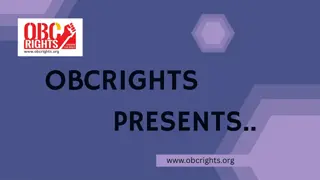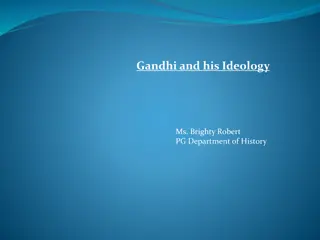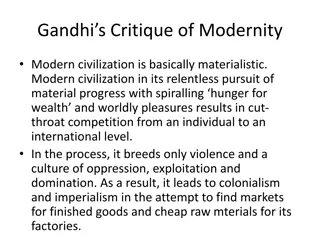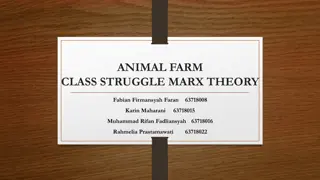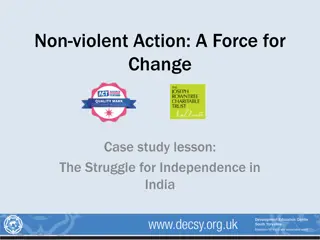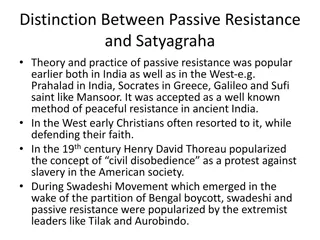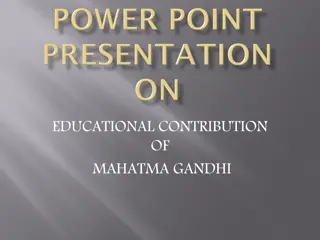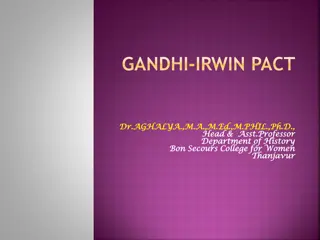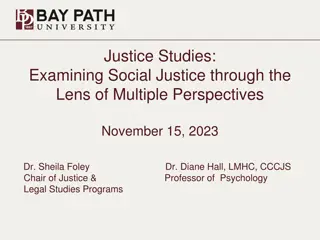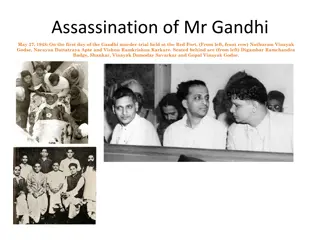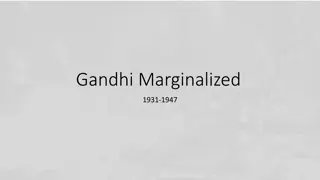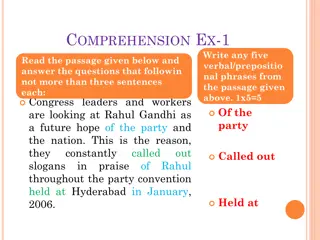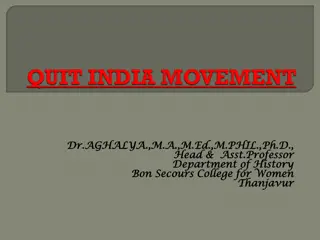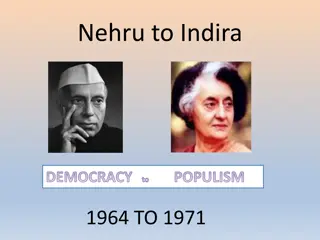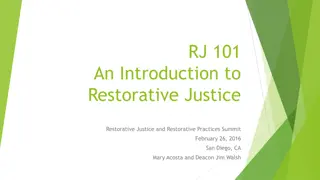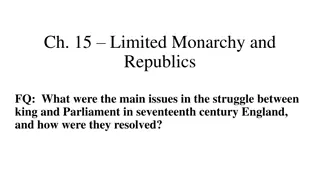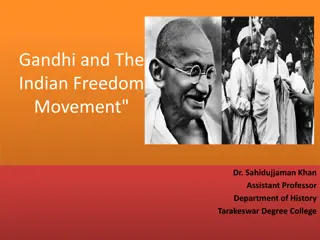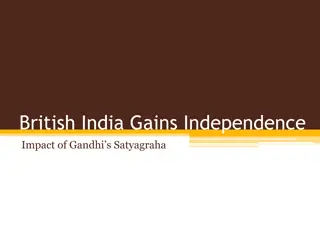Indigo: A Story of Gandhi's Struggle for Justice in Champaran
"Louis Fischer narrates the inspiring tale of Mahatma Gandhi's fight against the unjust practices forced upon the poor peasants of Champaran. Through nonviolent civil disobedience, Gandhi successfully challenges the exploitative British landlords, leading to a significant victory for the oppressed farmers. This historical account sheds light on Gandhi's dedication to social justice and his pivotal role in India's independence movement."
Download Presentation

Please find below an Image/Link to download the presentation.
The content on the website is provided AS IS for your information and personal use only. It may not be sold, licensed, or shared on other websites without obtaining consent from the author.If you encounter any issues during the download, it is possible that the publisher has removed the file from their server.
You are allowed to download the files provided on this website for personal or commercial use, subject to the condition that they are used lawfully. All files are the property of their respective owners.
The content on the website is provided AS IS for your information and personal use only. It may not be sold, licensed, or shared on other websites without obtaining consent from the author.
E N D
Presentation Transcript
INDIGO By Louis Fischer
ABOUT THE AUTHOR Louis Fischer (1896-1970) was born in Philadelphia in 1896. He served as a volunteer in the British Army between 1918-1920. Fischer made a career as a journalist and wrote for The New York Times, The Saturday Review and for European and Asian publications. He was also a member of the faculty of Princeton University.
INTRODUCTION In 'Indigo Louis Fischer describes how Mahatma Gandhi took an interest in the poor peasants/farmer of Champaran in 1916. The sharecroppers of Champaran were forced to grow indigo according to an old agreement. The cruel and cunning landlords extorted money from the poor and illiterate peasants. They made them sign a new agreement. They wanted more money for freeing their land. Gandhi s long and heroic struggle ended with the victory of the civil disobedience. compelled/forced to return twenty-five percent of the money they had extorted/taken from the sharecroppers. The English landlords were
VOCABULARY Convention: agreement Peasant: small farmer Emaciated: thin Sharecroppers: a tenant farmer who gives a part of each crop as rent. Resolute: determined Tenacity: determination Haunches: thighs Yeoman: a man who cultivates a small piece of land Pestered: bother, harass Harbour: here, entertain Advent: arrival Conveyance: transportation Chided: criticize, scold Arable: land suitable for farming Tenants: occupants paying rent in cash or kind Estate: property
Irksome: irritating Thugs: cheats Bully: trying to harm others considering them to be weak Forthwith: immediately, at once Multitude: a large number of people Hitherto: Earlier, Previously Conscience: sense of right and wrong Conferred: granted Upshot: result, conclusion Desertion: action of leaving a place, organization etc Depositions: a formal written statement Throbbed: produced a lot of vibrations due to a huge crowd Vehement: showing strong feeling; forceful, passionate, or intense. Protracted: lasting for a long time or longer than expected or usual. Entreaty: an earnest or humble request Deceitfully: dishonestly Extorted: took forcibly Deadlock: a situation in which no progress can be made
SUMMARY Louis Fischer met Gandhi in 1942 at his ashram in Sevagram. Gandhi told him that how he initiated the departure of the British from India. He recalled that it in 1917 at the request of Rajkumar Shukla, a sharecropper from Champaran, he visited the place. Gandhi had gone to Lucknow to attend the annual meeting of Indian National Congress in the year 1916. Shukla told him that he had come from Champaran to seek his help in order to safeguard the interests of the sharecroppers. Gandhi told him that he was busy so Shukla accompanied him to various places till he consented to visit Chaparan. His firm decision impressed Gandhiji and he promised him that he would visit Calcutta at a particular date and then Shukla could come and take him along to Champaran. Shukla met him at Calcutta and they took a train to Patna.
Gandhi went to lawyer Rajendra Prasads house and they waited for him. In order to grab complete knowledge of the situation, he reached Muzzafarpur on 15th April 1917. He was welcomed by Prof. J.B Kriplani and his students. Gandhi was surprised to see the immense support for an advocate of home rule like him. He also met some lawyers who were already handling cases of sharecroppers. As per the contract, 15 percent of the peasant s land holding was to be reserved for cultivation of indigo, the crop of which was given to the landlord as rent. This system was very oppressive. Gandhi wanted to help the sharecroppers. So he visited the British landlord association but he was not given any information because he was an outsider. He then went to the commissioner of Tirhut division who threatened Gandhi and ask him to leave Tirhut. Instead of returning, he went to Motihari. Here he started gathering complete information about the indigo contract. He was accompanied by many lawyers. One day as he was on his way to meet a peasant, who was maltreated by the indigo planters, he was stopped by the police superintendent s messenger who served him a notice asking him to leave. Gandhi received the notice but disobeyed the order.
A case was filed against him. Many lawyers came to advise him but when he stressed, they all joined his struggle and even consented to go to jail in order to help the poor peasants. On the day of trial, a large crowd gathered near the court. It became impossible to handle them. Gandhi helped the officers to control the crowd. Gandhi gave his statement that he was not a lawbreaker but he disobeyed so that he could help the peasants. He was granted bail and later on, the case against him was dropped. Gandhi and his associates started gathering all sorts of information related to the indigo contract and its misuse. Later, a commission was set up to look into the matter. After the inquiry was conducted, the planters were found guilty and were asked to pay back to the peasants. Expecting refusal, they offered to pay only 25 percent of the amount. Gandhi accepted this too because he wanted to free the sharecroppers from the binding of the indigo contract.
He opened six schools in Champaran villages and volunteers like Mahadev Desai, Narhari Parikh, and his son, Devdas taught them. Kasturbai, the wife of Gandhi used to teach personal hygiene. Later on, with the help of a volunteer doctor he provided medical facility to the natives of Champaran, thus making their life a bit better. A peace maker, Andrews wanted to volunteer at Champaran ashram. But Gandhi refused as he wanted Indians to learn the lesson of self reliance so that they would not depend on others. Gandhi told the writer that it was Champaran s incident that made him think that he did not need the Britisher s advice while he was in his own country.


